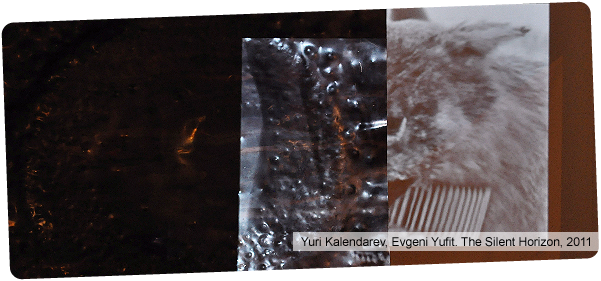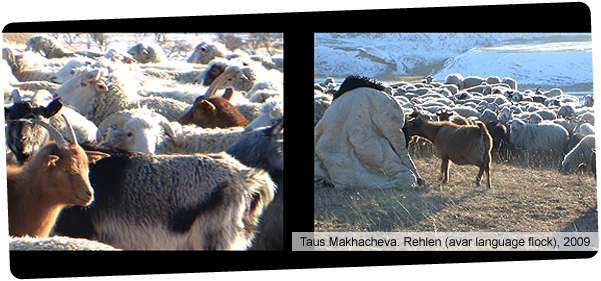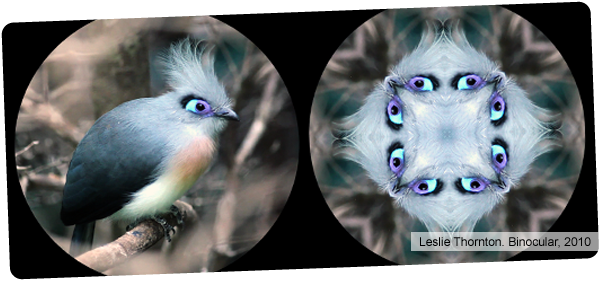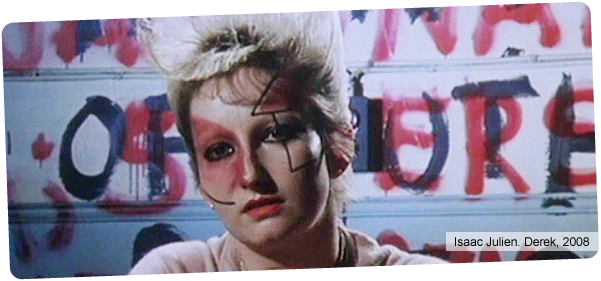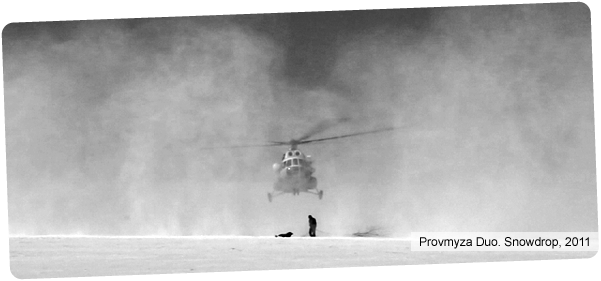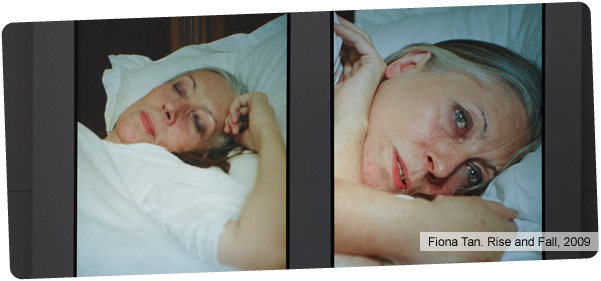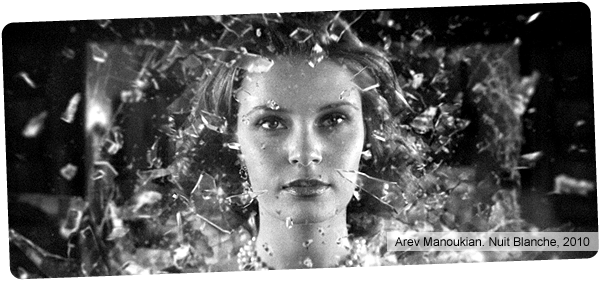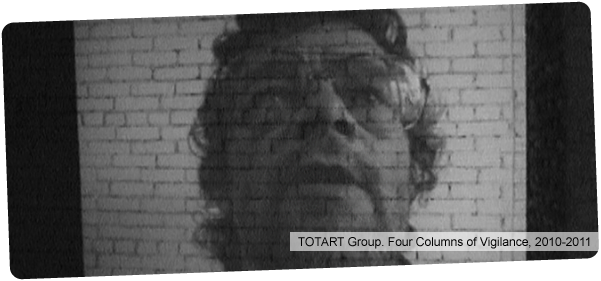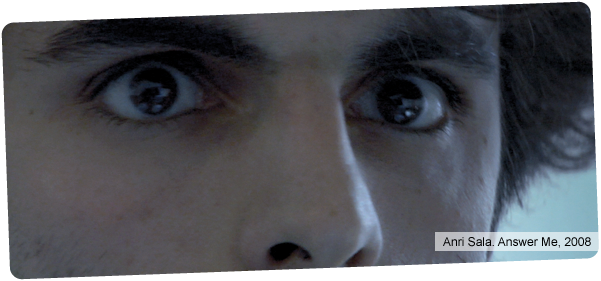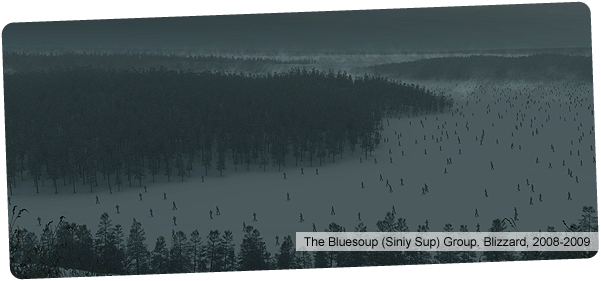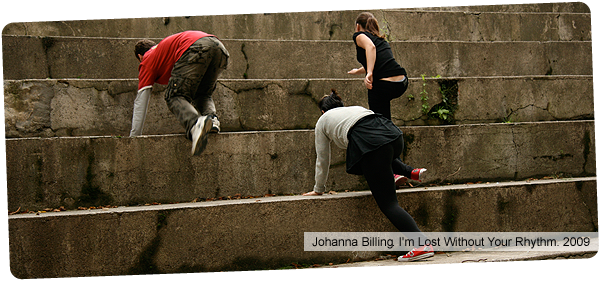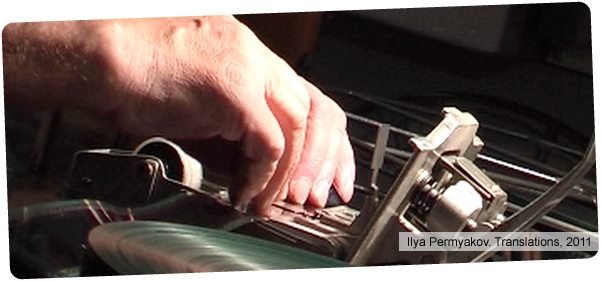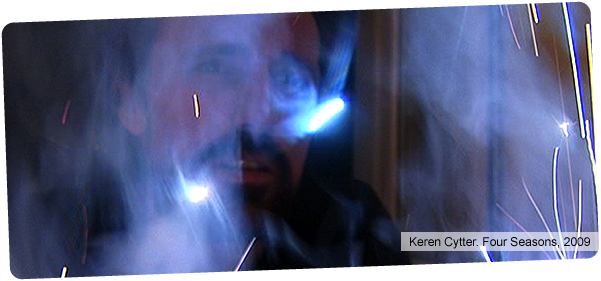About Media Forum

News

Programme
Programme at the Moscow Museum of Modern Art
Programme at the Garage Centre for Contemporary Culture

Schedule

Participants

Press

Partners
XII Media Forum of 33rd Moscow International Film Festival
24–28 June 2011
Organized by: MediaFest, MediaArtLab Centre for Art and Culture
Co-organizers: Moscow Museum of Modern Art, the Garage Centre for Contemporary Culture
With the support of: Royal Netherlands Embassy, Mondriaan Foundation, Goethe Institute in Moscow, Japan Foundation
![]() Expanded Cinema Catalogue (.pdf)
Expanded Cinema Catalogue (.pdf)
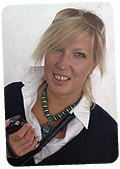
Olga Shishko, art historian, curator, director and founder of the MediaArtLab, art-director of the MIFF Media Forum, curator of Media Forum exhibition projects:
Media Forum at the Moscow International Film Festival has for the last twelve years been responsible for the borderline territory between cinema and contemporary art. According to the theorists and practitioners of the art of moving images it is exactly there that most interesting and promising events in screen culture are happening: multiscreen cinema is evolving, multimedia art works are created in real time mode and with active audience unteraction, new strategies of distribution and contextual analysis of video works are developing. Apparantly, this is the future of both cinema and video art as a whole.
This XII Media Forum presents what is probably the most ambitious project in all of its history — the Expanded Cinema exhibition chosen from the latest and most striking works on the verge of cinema and video art. Each of these works has its own interpretation of the moving images, its own method of working with the time and space of the screen. The organizers aimed to show the whole range of these art strategies and their distinctness, as they are special and very relevant now, having overtaken major art festivals worldwide. The expositions at the Moscow Museum of Modern Art and the Garage Centre for Contemporary Culture are supplemented by sessions with the artists participating in the project, their lectures and workshops, live performances and live communication of the audience with the most outstanding art figures of our time.
For the twelve years that the Media Forum programme has existed its organizers had to explain in almost every interview what the project wholly dedicated to visual art is doing on the territory of cinema. What do sound performances, video art, multi-channel installations and net art have in common with the film sphere? Each year Media Forum tried to explain this in its events: Peter Greenaway delivered a whole lecture on death of cinema for the triumph of visual art, artists, filmmakers and critics at Media Forum panels discussed the border-line aesthetics, Media Forum guests, such as Eve Sussman, Gary Hill, Jesper Just and others have each year and with very programme brought to Moscow their premiers on the edge of cinematic and fine arts. And finally this year the organizers decided to answer all questions summarily with a large-scale project demonstrating the flow of forms, subjects, themes, meaning and ideas from one sphere of the visual into another. The basic idea for this comparison was the concept of expanded cinema.
The Expanded Cinema exhibition
Part 1. Moscow Museum of Modern Art, June 13 – July 3 2011
Part 2. the Garage Centre for Contemporary Culture, June 24 – July 24 2011
Probably the first questions a layman asks confronted with works of video artists are: is it a kind of cinema? Why is it so strange? Why is it shown in museums? Setting borders between the territory of visual art and classic cinema have been attempted in dozens of articles. And to answer the neophyte’s question every expert will explain with authority that video art doesn’t have a cinematic narrative structure, linear sequence of events and the category of causality doesn’t apply to it. You will be told of the specific character of museum space, the specifics of temporal works’ perception in gallery space, of an active versus a passive viewer. And... the experts would probably be wrong. Today cinema has accepted the non-linear narrative. Video art in turn has found its own niche in cinema distribution, its masters feel at home at the best film festivals of this planet. Shirin Neshat, Steve McQueen, Sam Taylor-Wood and the Provmyza duo have chosen the red carpet (and not the museum space) to present their projects and the cinema world in its turn has embraced then wholeheartedly, giving them awards of every kind. The last Venice film festival has put directly the question of the cinema’s future as based upon the many years of video art achievements.
Media Forum has set his goal to explore all nuances of this subject in a two-part exhibition — first at the MMoMA and than at the Garage.
In the Moscow Museum of Modern Art exhibition the participants are: Fiona Tan (the Netherlands), Johanna Billing (Sweden), Harun Faroсki (Germany), Gary Hill (USA), Anri Sala (Albania/France), Leslie Thornton (USA), Ranbir Kaleka (India), Arev Manoukian (Canada), Boris Eldagsen (Germany), Juri Kalendarev (Italy/Russia), Evgeny Ufit (Russia), Doug Aitken (USA), Taus Makhacheva (Russia), Keren Cytter (Israel/Germany), Ilya Permyakov (Russia), the Tot-Art group (Russia), Elena Kovylina (Russia), Almagul Menlibaeva (Kazakhstan), Provmyza group (Russia), Blue Soup group (Russia), Juri Albert (Russia) and Victor Alimpiev (Russia).
At the Garage Centre for Contemporary Culture tree multi-screen video installations will be shown: the European premiere of Yang Fudong’s Fifth Night (China, 2010), the most recent work by Eija Liisa Ahtila — the Annunciation (Finland, 2010) and Derek – the central part of Isaak Julien’s famous projects (UK, 2008).
In spite of the co-existence of several general theoretical approaches to distinguish video art form cinema, each of the exhibition’s participants explores this theme in their own unique way. Their works serve as visual references to completely different fields of cinematic: the Hollywood spectacle, sophisticated early cinema experiments, truth of the documentary films, aesthetics of film noir and archive material transformed by time.
Test Pattern — a live multimedia performance by Ryoji Ikeda (Japan) — the Media Forum official opening June 24 2011
If video artists make us focus on the very process of perceiving visual information and not only on its content, sound artists do the same with hearing. That’s why Media Forum has invited the famous Japanese sound artist, the star of major European media festivals to open this year’s programme. The organizers suppose that his live performance Test Pattern (2010) will not only be a colorful prelude to this year events, but also a necessary parallel to what is happening in other fields of media creativity, where the idea of broadening the limits of perception and elimination of borders between various communication channels is also realized. As with most people the visual sphere is a dominant one, Ryoji Ikeda makes us analyze the sound flow through a certain set of visual images, materializing the sound with detailed attention worthy of a mathematician and a bright expressiveness accessible only to visual artists.
Screenings and workshops by the participants at the Garage Centre for Contemporary Culture, June 24 – 28 2011
Media Forum traditionally emphasizes the educational aspect of its programme and the live communication of its audience with acknowledged masters of world multimedia art: Eija Liisa Ahtila (Finland), Isaac Julien (UK), Fiona Tan (the Netherlands), Leslie Tornton (USA), Ranbir Kaleka (India) and Elena Kovylina (Russia) will present their works and help the audience understand the relevant questions of contemporary art today.
Expanded Cinema research catalogue
A research catalogue will be published for the opening of Media Forum with key publications on the interaction of the two spheres of screen culture and presentation of works by Media Forum participants in all the variety of their perception and analysis of the “expanded cinema” theme.
Locations:
The Garage Centre for Contemporary Culture
Obraztsova str, 19/2, bld. 1
http://www.garageccc.com/
The Moscow Museum of Modern Art
Yermolaevsky lane, 17
http://www.mmoma.ru/
Press contacts:
Elena Krylova
tel. +7 (916) 550-04-31

